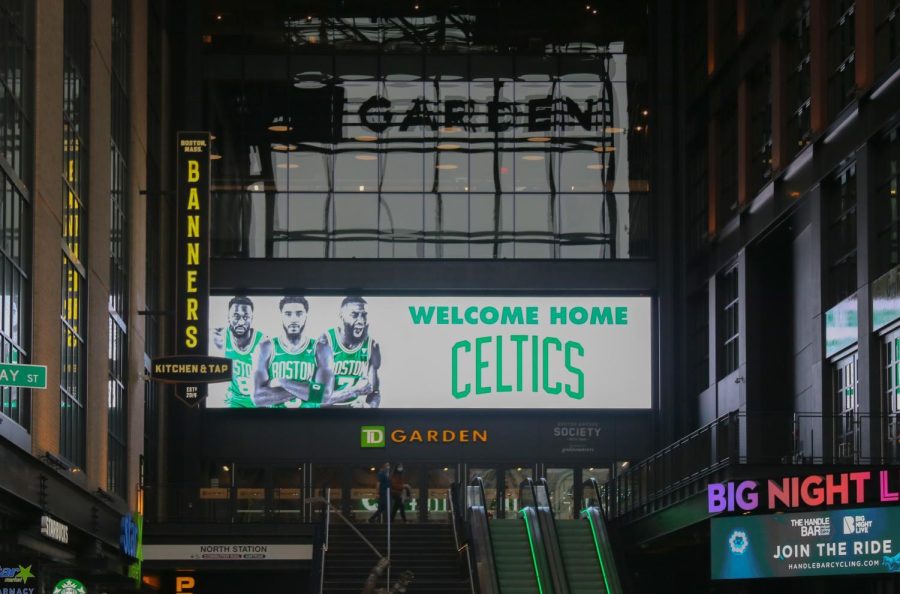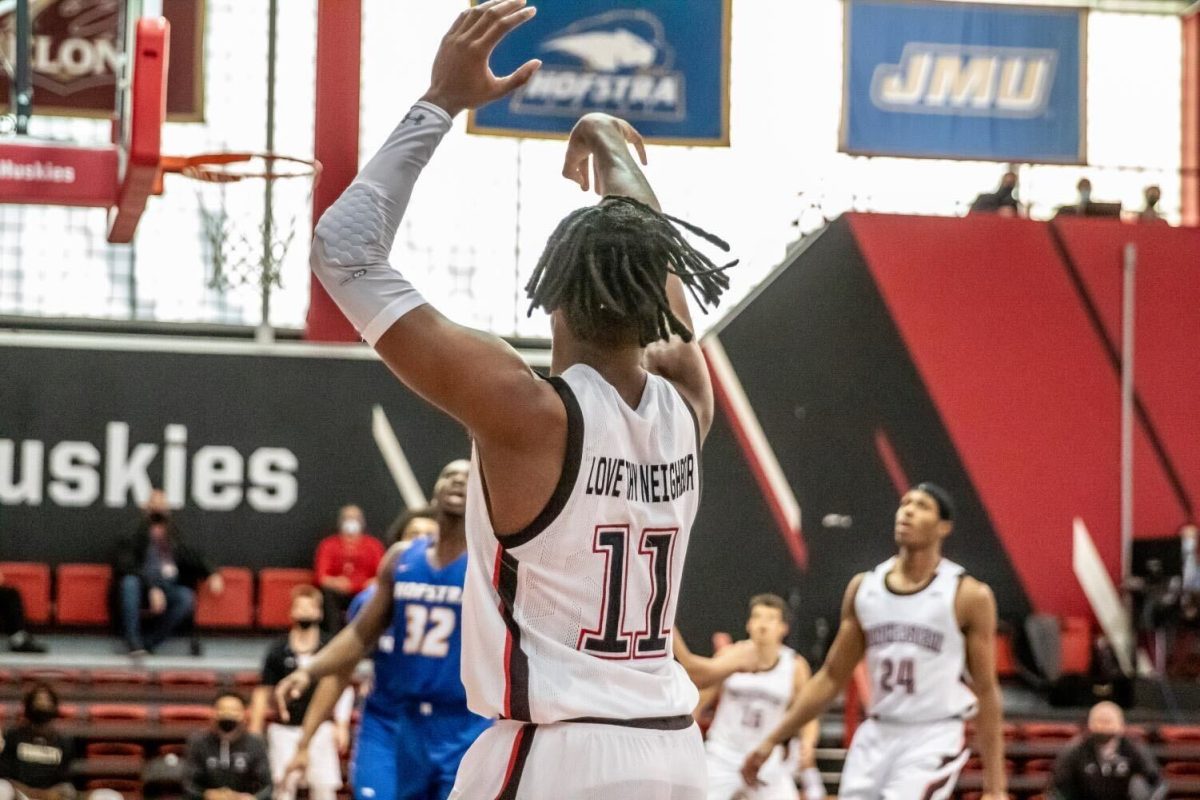Q&A: Boston Celtics commentator Mike Gorman discusses his experience in the broadcasting industry
The Boston Celtics are set to play the Atlanta Hawks in the first round of the NBA playoffs on Saturday. Mike Gorman has covered the 17-time championship Boston Celtics as a play-by-play commentator for NBC Sports since the early 1980s.
April 12, 2023
Mike Gorman, a long-time Boston Celtics commentator for NBC Sports, has covered the 17-time championship winning team since the early 1980s, making him a prominent voice in the journalism industry. From superstar Larry Bird to powerhouse small forward Jayson Tatum, Gorman, a Boston native, has truly seen it all.
“I always want the Celtics to win every game, every single game they play,” Gorman said.
He’s made the calls for over 40 years. He’s been immersed in the broadcasting world for decades. Gorman, a true player, “homer,” and lover of basketball, now age 77, has made endless contributions to the Celtics franchise, where his unique story and career accomplishments speak for themselves.
In this Q&A with The News, Gorman discusses the progression of his broadcasting career and gives advice to aspiring commentators.
The following transcript was edited for content and clarity.
HN: What inspired you to become a broadcaster?
Gorman: Well, I started much smaller than being with the Celtics obviously. I was in the military after I got out of college, and they had these meetings every Monday with all of the people in the squadron. They needed somebody to stand out in front of the group to run the meetings with the microphone, and this got assigned to me early on. I found myself very comfortable in front of crowds with microphones — it didn’t bother me at all. I figured that once I got out of the Navy that maybe I could try to put this to an advantage. Just the ability to talk and not worry about what people thought was awesome and, well, I love sports. So I went and got a job in a small radio station in New Bedford, Massachusetts, actually, and started doing anything and everything I could do.
HN: How did you begin broadcasting? How did you then move to NBC?
Gorman: I started in New Bedford, which is a very small market, and a fellow driving through New Bedford on his way to Providence from Cape Cod heard me on the radio and he called me up and asked me if I wanted to come to work in Providence, where he was the news director. I got a job there and worked in Providence for two years on the radio and then I got offered a weekend television job. Somebody from the Celtics saw me do it and offered me a job in Boston. This all took place over about a three or four year period. I never applied for a job in 40 years in the business. I’ve always gotten a job because somebody heard me and offered me another job.
HN: Growing up in Massachusetts, how exciting was it to work for your home team?
Gorman: If I could just have one job, I’d have the job I have right now, which is still being the Celtics guy, because that’s what I like. I grew up in Dorchester, Massachusetts, and after 40 years on TV, there are not many places in the city that I can go where people don’t know who I am, and that’s really kind of nice. When I was 14 years old, I was sneaking into [TD Garden] to watch [the Celtics] play. I’ve always been a Celtics fan and I wanted to be a basketball player and once I got to the point in college, I wasn’t good enough anymore. So I tried to figure out some other way to stay with the game, and that’s how I looked at being an announcer.
HN: How has broadcasting changed over the course of your career?
Gorman: I think it’s changed a lot, mostly because technology has changed so quickly. At the television station that I used to work at, we had a photographer who had to go out with a camera and shoot an actual film set and then run back to the station. Now, the time [of production] is not only cut in half, it’s cut by 90%. You can produce everything much, much quicker than you could have ever done it before. One time, I commented at my high school football game, and I was hanging off a telephone pole because that’s the only place I could make a connection to. Yeah, that doesn’t happen today — it’s much easier.
HN: What has been your biggest accomplishment in the broadcasting world?
Gorman: That’s an easy question for me to answer. To give you some sense of how important the answer is to me … I’ve had good opportunities. I’ve had a chance to go to Barcelona for the Olympics, I went to London and worked for NBC, I’ve worked national games for ESPN for about four or five years, and I was a regular guy at Big East Games, so I’ve had a chance to do very big games on big nights in big markets. But the one thing that is the biggest accomplishment of my life is the relationship that I had with Tom Heinsohn and the fact that we were able to work together for 40 years as partners. I think the whole reason why was that Tommy never wanted to do the things that I did, and I never wanted to do the things that he did. If you were to tell me there was only one thing that people are going to remember me for, I hope they would say well, he and Tommy Heinsohn were really good together. I miss him everyday.
HN: What is your signature style?
Gorman: Johnny Moss was a legendary announcer for the Celtics on the radio when I was a kid, and when I first came to TV, he was still doing radio. In the early stages, he said, ‘You have to come up with a signature call, something that you say all the time when you think something is a big deal.’ His was ‘bang!’ I couldn’t think of anything to call initially, and then I thought of ‘got it!’ and started saying ‘got it!’ after baskets. He loved it and said, ‘Keep that, you’ll have that forever.’
HN: Any tips for someone who is aspiring to be in the broadcasting world?
Gorman: Don’t think you can start in Boston or in New York or Philadelphia. You got to start in someplace you’ve barely ever heard of, but you’re gonna get a chance to do things you would never do in Boston. So it’s funny, your workload actually gets less the higher you go up. So as long as you do not think about the fact that you’re working 20 hours a day, hopefully if you’re doing something you really love, it could be easy to do. The more you can learn, the better you are. In other words, if you got a job at Northeastern or another radio station or something like that, and they won’t put you on the air, but they’ll make you be an engineer, then be the engineer. If you’re getting involved with TV and you watch the cameramen work, you can find out how he does what he does. The more you learn about what they do, the more you’ll be able to control what you go out on the air as. You want to know what everyone does. You need to know all of this stuff because you’ll be a much better person, number one, as a reporter or producer. But even more important than that is that the guys on the crew and the women on the crew will respect you because you respect what they do.







